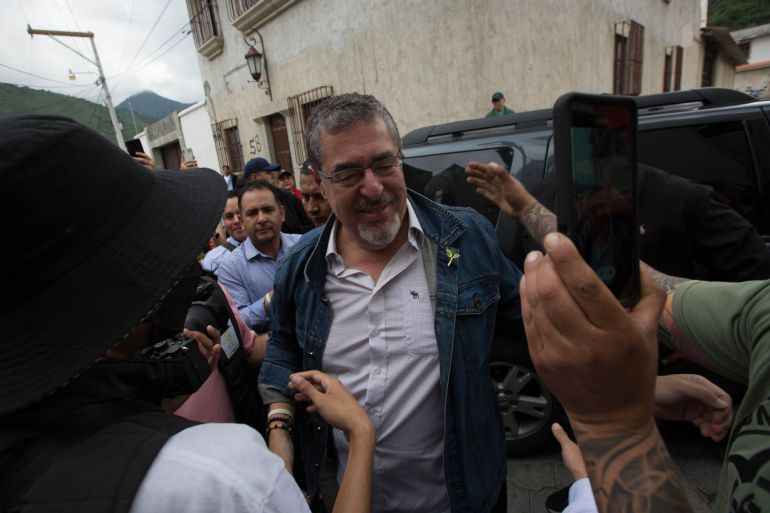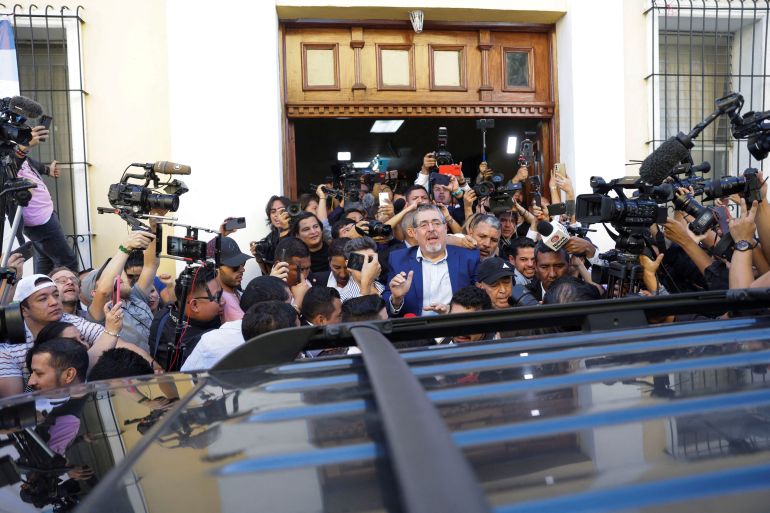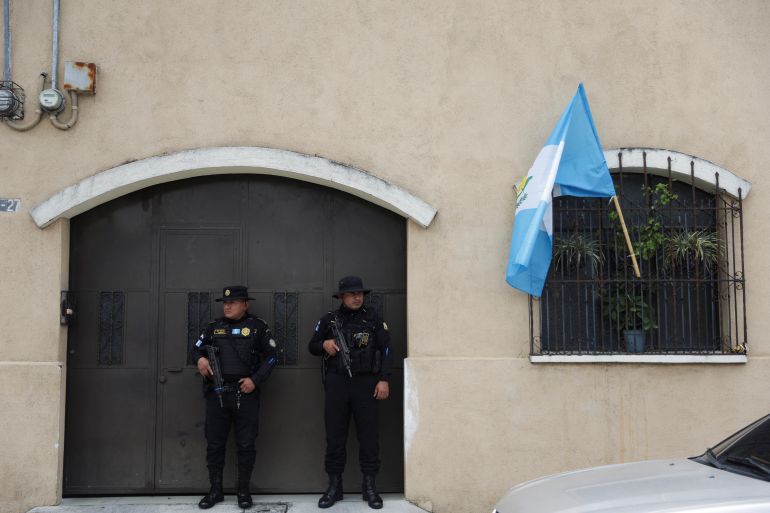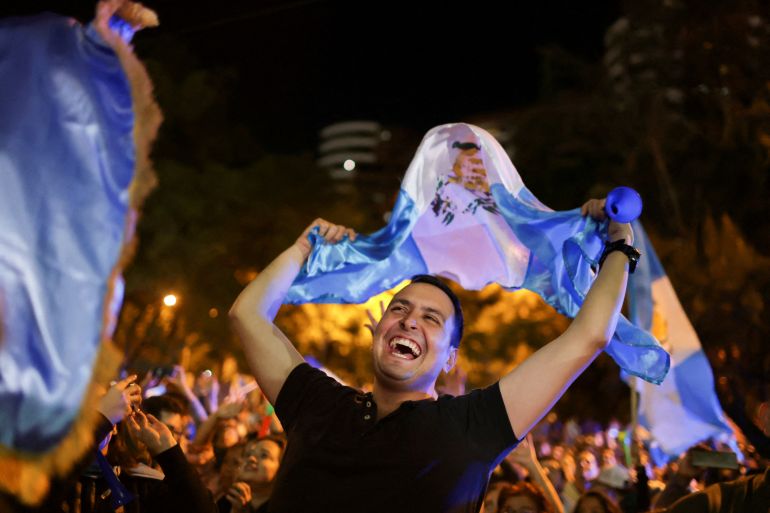The conservative National Unity of Peace party has filed a complaint alleging inconsistencies in the August 20 election.

Progressive politician Bernardo Arevalo stopped in Jocotenango, part of the Guatemalan department of Sacatepequez, as he campaigned for the presidency in July
[Jeff Abbott/Al Jazeera]
By Jeff Abbott
Published On 25 Aug 2023
Guatemala City, Guatemala – Guatemala City’s central plaza is traditionally a gathering spot for protests. But on the night of August 20, it was filled with jubilation, as supporters celebrated Bernardo Arevalo’s election as president.
A congressional representative, academic and outspoken critic of corruption, Arevalo won Guatemala’s presidential run-off in a landslide, earning an estimated 58 percent of the votes.
But while his victory has reinvigorated hopes for Guatemala’s fragile democracy, experts warn of challenges ahead, as Arevalo faces a hostile public prosecutor, an opposition-led legislature and questions of entrenched corruption in the government.
Even his challenger, conservative Sandra Torres, has yet to concede defeat, fuelling speculation that his election could be contested. Torres’s party, National Unity of Peace (UNE), filed a complaint on Friday alleging inconsistencies in the vote tally.
And one day earlier, the Inter-American Commission on Human Rights called for additional security to protect Arevalo, as he faced possible death threats and other “serious, urgent” risks to his wellbeing.
“Arevalo symbolises the possibility to begin again — to reconstruct state institutions and combat corruption,” Marielos Chang, an independent political analyst, told Al Jazeera. “But he faces a great challenge.”

Bernardo Arevalo winds his way through a crowd of reporters in Guatemala City, Guatemala, on August 20 [File: Pilar Olivares/Reuters]
Underdog turned frontrunner
When he is sworn into office on January 14, Arevalo will become Guatemala’s first progressive president in seven decades, breaking a streak of right-wing governments.
“Arevalo’s victory was a referendum on the ruling coalition in Guatemala,” Edgar Ortiz, a political analyst and constitutional lawyer, told Al Jazeera.
“He is a very unusual candidate in Latin American politics,” he explained. “He’s an intellectual, he’s a peacemaker, he’s a good negotiator, and he will need those skills in order to govern a country with political fragmentation, with organised crime and with distrust from conservative sectors that consider Arevalo too progressive for Guatemalan politics.”
But the 64-year-old Arevalo is no stranger to national politics. His father was former President Juan Jose Arevalo, who went into exile after a coup d’état deposed his successor in 1954.
As a result, the younger Arevalo was born in Uruguay. After pursuing degrees at universities in Israel and the Netherlands, he followed in his father’s footsteps, entering both academics and politics.
In the 1990s, Arevalo served as ambassador to Spain. And in 2019, he won a seat in Congress with the recently formed Seed Movement, a left-leaning party formed around anti-corruption advocacy.
Arevalo’s success in the first round of the 2023 presidential election came as a surprise to many, as he had consistently polled at less than 3 percent in national surveys.
His second-place finish earned him a spot in the run-off vote — as well as a wave of backlash.
When he is sworn into office on January 14, Arevalo will become Guatemala’s first progressive president in seven decades, breaking a streak of right-wing governments.
“Arevalo’s victory was a referendum on the ruling coalition in Guatemala,” Edgar Ortiz, a political analyst and constitutional lawyer, told Al Jazeera.
“He is a very unusual candidate in Latin American politics,” he explained. “He’s an intellectual, he’s a peacemaker, he’s a good negotiator, and he will need those skills in order to govern a country with political fragmentation, with organised crime and with distrust from conservative sectors that consider Arevalo too progressive for Guatemalan politics.”
But the 64-year-old Arevalo is no stranger to national politics. His father was former President Juan Jose Arevalo, who went into exile after a coup d’état deposed his successor in 1954.
As a result, the younger Arevalo was born in Uruguay. After pursuing degrees at universities in Israel and the Netherlands, he followed in his father’s footsteps, entering both academics and politics.
In the 1990s, Arevalo served as ambassador to Spain. And in 2019, he won a seat in Congress with the recently formed Seed Movement, a left-leaning party formed around anti-corruption advocacy.
Arevalo’s success in the first round of the 2023 presidential election came as a surprise to many, as he had consistently polled at less than 3 percent in national surveys.
His second-place finish earned him a spot in the run-off vote — as well as a wave of backlash.
\

President-elect Bernardo Arevalo, centre, gestures to reporters outside his home in Guatemala City, Guatemala, on August 22
[File: Pilar Olivares/Reuters]
An ongoing investigation
As the August run-off election approached, Arevalo began to climb in the polls, overtaking Torres, the early frontrunner.
But even as a candidate, he faced pushback from within government institutions. In July, shortly after the results of the first round of voting were certified, the Special Prosecutor’s Office Against Impunity sought to suspend the Seed Movement, alleging there were irregularities in how the party was formed in 2017.
The Special Prosecutor’s Office claimed it had found 5,000 fraudulent signatures in the party’s membership rolls, including over a dozen dead people.
But critics have questioned the agency’s motives. The Special Prosecutor’s Office is led by Rafael Curruchiche, a politician the United States has sanctioned as a “corrupt and undemocratic actor” for raising “spurious claims” against prosecutors involved in anticorruption efforts.
Nevertheless, the Special Prosecutor’s Office has promised to continue its investigation into the Seed Movement even after Arevalo’s election.
If it succeeds in annulling the party, politicians within the Seed Movement could be marooned without a legislative bloc, preventing them from being appointed to key commissions.

Police officers guard the home of Guatemala’s President-elect Bernardo Arevalo, who has faced death threats since his victory
[File: Pilar Olivares/Reuters]
Questions of corruption
Even with his party to back him, Arevalo will face an uphill battle to build consensus and fight what many believe to be institutional corruption.
In recent years, journalists, lawyers, advocates and judges involved in anticorruption efforts have fled the country or faced arrest on what critics believe are trumped-up charges.
Meanwhile, Arevalo and his running mate Karin Herrera Aguilar have both faced “stigmatisation, harassment, hounding, public disclosure of personal details on social media and threats including two specific plans to hurt them and even kill them”, according to the Inter-American Commission on Human Rights.
Corruption has been a longstanding issue in Guatemala, one that has undermined confidence in public institutions.
According to an August poll from the market research firm CID Gallup and the Foundation for Liberty and Freedom, 70 percent of the population sees the administration of outgoing President Alejandro Giammattei as corrupt.
However, implementing change could be difficult. Upon taking office, Arevalo will confront a legislature stacked with opponents. In this year’s elections, the current ruling party Vamos and Torres’s UNE party won a combined 67 seats out of a total of 160, giving conservatives control over Congress.
The Seed Movement, meanwhile, only earned 23 seats.
But political analysts have speculated that Arevalo could bridge the political divide if he seeks broad consensus.
“Arevalo will need to be very open to talk to many sectors of society, not only the political sector,” Ortiz said.
“He will need to talk to this old political party system that he ran against and that he beat, and he also will need to bring all other sectors together, including the productive sectors, which are suspicious of him.”

Supporters of Bernardo Arevalo celebrate in Guatemala City, Guatemala, after his victory in a run-off election on August 20
[File: Pilar Olivares/Reuters]
Economic concerns spurring migration
Faced with such opposition, Ortiz believes Arevalo will need to focus on achieving short-term wins with issues like crime and medicine shortages in hospitals.
“Expectations are really high, but the problems are really hard to fix,” Ortiz says. “In the first six months, healthcare, security and education are the areas in which he can make a big difference.”
Organised crime remains an issue throughout the Central American region. In Guatemala, the Centre for National Economic Research found an uptick in homicides between 2021 and 2022, for a rate of 17.3 murders per 100,000 inhabitants.
Poverty is on the rise, too. Around 60 percent of the population rests below the poverty line, and the country has some of the highest rates of youth malnutrition in Latin America, with the United Nations estimating that one out of every two children suffers from it.
The dire conditions have forced hundreds of people a day to leave Guatemala to find opportunities elsewhere.
But Arevalo and the Seed Movement have proposed to stem migration by offering greater job training and employment, including through temporary work programmes.
He has also expressed openness to working with the international community, especially Mexico and the US, to address the migration crisis.
“We are willing to collaborate and build international cooperation to find structural solutions to the problem of migration,” Jonathan Menkos, a congressman-elect and economist who worked on the Seed Movement party’s governance plan, told Al Jazeera.
“We have to think about the wellbeing of the people and how we reduce the needs that people have that force them to migrate to another country.”
SOURCE: AL JAZEERA
No comments:
Post a Comment